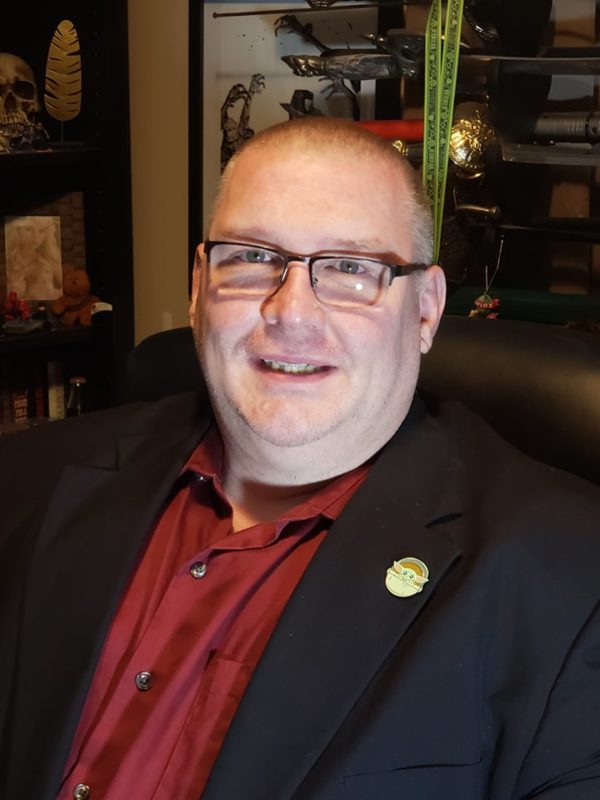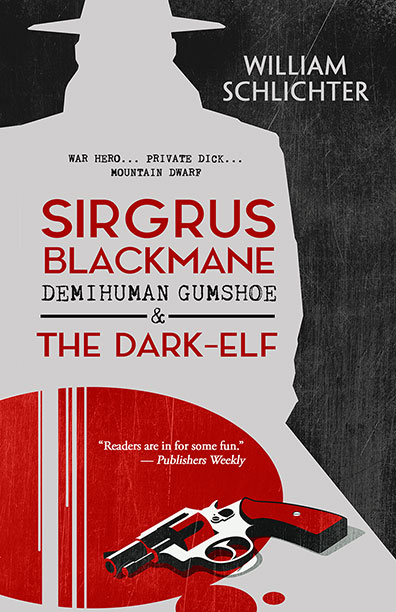
Welcome to my weekly Author Spotlight. I’ve asked a bunch of my author friends to answer a set of interview questions, and to share their latest work.
Today: William Schlichter is an award-winning screenwriter and author who enjoys writing science fiction, fantasy, and horror and exploring the phantasmagorical world of the undead. His popular No Room in Hell zombie series (The Good, the Bad, and the Undead; 400 Miles to Graceland; Aftershocks) and SKA: Serial Killers Anonymous about a serial killer support group are fan favorites, and he enjoys spending time on the convention circuit.
His full-length feature script, Incinta, is a 2014 New Orleans Horror Film Festival finalist, a 2015 Beverly Hills Film Festival finalist, and an Official Selected finalist in the 2016 Irvine Film Festival. His TV spec script episode of The Walking Dead placed third in the 2013 Broadcast Education Association National Festival of Media Arts.
William has a Bachelor of Science in Education from Southeast Missouri State and a Masters of Arts in Theater from Missouri State University. When not writing, William enjoys traveling, and teaching acting, composition, and creative writing. He resides in Missouri where he is currently working on his next novel.
Thanks so much, William, for joining me!
J. Scott Coatsworth: What was your first published work? Tell me a little about it.
William Schlichter: My first published novel is a work of horror in the zombie genre called The Good The Bad And The Undead. The title the of the series is No Room In Hell. I got to meet George Romero at a comicon and would have loved to pick his brain about zombie culture. I wrote a zombie novel that shows parts of the country that hasn’t been seen in most zombie books. I set it in the Midwest with intelligent survivors. I get so tired of stupid people surviving the zombie apocalypse. I also wanted to show how to deal with zombies if the majority of people have guns. A lot of zombie novels and TV shows they can’t ever seem to find a gun and in the Midwest that is part of the culture. I do explore some other social issues without smacking the reader in the face with them. If you notice them great, if you don’t you get to have a fun zombie ride that’s different than most zombie books. I don’t start off on day one. I jump to 10 months in which is about the time gas is supposed to expire. That is something zombie novels and every other apocalyptic movie gets wrong. The end of the world happened 30 years ago and yet we can still drive our cars. That will become a struggle for my survivors. We find out what happens to the military. Again, I want to address a lot of issues that a lot of zombie books just seem to ignore and in most, unless they are about the military don’t share what happened to trained competent soldiers. We follow three main characters and find out when we have a group of people that actually try to build a new place to live making good choices. The rest of the world has fallen apart so you still have lots of problems for them to face but there are ways to survive these situations and not be stupid.
JSC: Have you ever taken a trip to research a story? Tell me about it.
WS: When I was in Oklahoma doing a book signing, I had some time before the show after setting up my booth. I went to a gun store where you can rent and fire guns and military weapons that are not legal to own privately. They had a Thompson and I really, really wanted to fire one of these rifles. During the climax of my Sirius Blackmane novel, I present the classic jazz age gangster gun battle. The bullet fueled fight with this machine gun wielded by our hero. I went to the place, and I rented a Thompson Submachine Gun. I went into the firing range on the property—you can’t leave with it. All the weapons are secure. You go there and the gunsmith instructed me in its proper use. He answered my questions. I squeezed off several clips, making notes in my head, and I got to take a picture holding the gun. You have to have fun. The gunsmith answered a few more questions that I had. I policed a couple of the spent brass, just to sit on my desk to think about even though .45 slugs are common, these are the one I shot out of a Thompson. The gunsmith asked if I wanted to shoot anything else. Of course, I wanted to shoot all kinds of guns, but I chose not to. I told him I said I’m working on a novel, and I don’t want to mess up my thoughts and feelings about shooting the Thompson by firing a weapon that might behave differently. I went back to the comicon and made some notes before it got started. That night I wrote several paragraphs about using the weapon and then I rewrote part of the ending of the novel to match my experience with firing the Thompson. I think that’s important if you have that opportunity to actually work with whatever you’re talking about in your novel to experience it. Whether you’re a gun person or not you can go to these firing ranges and rent a weapon, shoot it, make your notes, and understand what your character feels when they use them.
JSC: How long do you write each day?
WS: I try to write 1000 words a day. Some days I can do that in an hour, other days it takes eight. I’ve learned this it depends on what I’m working on. If the scene is super complicated it may take a while for the words to flow out of me. On those days I get 3000 or 5000 words, which I’ve done a few times, I have an idea and it flows. It pours out of me keeps coming, but sometimes those 300-word days are more difficult. I have a a challenging scene, or an emotional moment I’m trying to capture and that takes a while, but I would say I try to spend an hour or two a day writing. I’m also always reading. I listen to audiobooks in the car. I get brilliant ideas in the shower. I really need to get a waterproof pad and pen to keep in. Because it seems like when I’m doing something else that’s when a character moment or that story piece, I’m trying to put together just pops.
JSC: Are you a plotter or a pantser?
WS: Anytime I get this question online, or somebody posts it in a writer’s chat group wanting to know what people are. I always post that meme from Raiders of The Lost Ark when Indiana Jones says, “I don’t know. I’m making this up as I along.”
JSC: What is the most heartfelt thing a reader has said to you?
WS: I keep saying I am going to write down like my top 10 great book signing moments and sometimes new experiences happen to change the list. I get to meet people across the country. I got to moderate a writers panel with some very famous authors. The more you’re out there trying to convince people to read your work, the more adventures you have. I was in Nashville doing a comic con. I think I had three books published at the time and gentleman came up to the table with his daughter. He really really wanted to get my zombie novel and, of course, I sold it to him. He told me that he had just learned to read. I would guess he was in his late 40s maybe 50 and he had just learned to read five years ago. I was like wow, you have just learned to read, and you want to read my book, I mean I still almost tear up when I tell that story. I was so honored.
JSC: What were your goals and intentions in Sirgrus Blackmane, and how well do you feel you achieved them?
WS: I had a couple goals with Sirgrus. I really wanted to recreate the noir style of Dashiell Hammett and Raymond Chandler. I feel accomplished this writing style. I also wanted to tell a fantasy story and I didn’t want my characters to be in a castle or in a dungeon. I wanted to explore other time periods. I also wanted to deal with an issue that I feel is important and doesn’t get discussed like it should. We tend to ignore mental health problems in those that have served in the military, especially those who have served in combat. My main character, Sirgrus, suffers from shell shock from the Great War, as he struggles through life in a time period where a man was expected to just get over it. I also wanted to have the fun of being set during the Jazz Age with dragons and trolls, speakeasies and Tommy guns. It’s a fun story, but there are people who read it and see the deeper side of Sirgrus’ mental concerns. I think that’s important that we never forget that those problems exist and that we’ve come a long way since the 1920s but we still have a long way to go.
JSC: What secondary character would you like to explore more? Tell me about them.
WS: I plan to create a series of standalone novels with Sirgrus. There will be several reoccurring characters and of all of them I know which ones will come back or which ones I have a story in mind to explore further. What I found interesting was not a character I want to explore but many reviewers want me to explore Sirgrus’ Fae secretary, Rhoda. These reviewers all thought she was incredibly interesting and they wanted to know more. Right now, I’m not sure what I will do with her if I explore her further. I’m afraid if she’s explored too much, she might lose her mystic. I think part of what makes her so interesting is how mysterious she is so it it’ll be fun to bring her into the story more.
JSC: What are some day jobs that you have held? If any of them impacted your writing, share an example.
WS: I’ve held lots of jobs. One of these days I need to grow up and choose a career. I grew up on a farm. I have worked in various restaurants. It wasn’t a job, but I actually did graduate from EMT school, I did all the ride time, learned really quick I did not want to be thrown up on because apparently that’s like a thing that happens quite often. You want to talk about improving characters with medical knowledge after getting some real medical experience I think that definitely shapes my writing. It gives a new appreciation for those characters. Writers research what they don’t know and we try to get it as accurate as possible but to actually do it changes how you write it. Sometimes it’s the little nuances that only a medical person might pick up. I would say teaching greatly enhances my viewing of human behavior. As a theater teacher I learned how study characters, but to see them in action everyday shapes how you see people. I can’t say I understand humans because I’m not 100% sure teenagers are people, but I give characters certain quirks that I’ve picked up from students over the years and I’m sure some people would say kids don’t really behave that way and I’m like ‘Oh yeah, yeah they do’ I watched it for a whole year. This kid did it all the time, so I think any job you have where you can actually interact with people will improve your writing because you can go out and see how people really are and try to capture that on the page.
JSC: What’s your favorite line from any movie?
WS: I want you to know I love your questions because they’re not all standard writer questions. Sometimes you get asked the same questions over and over again, so these are different. My favorite line from a movie. Wow, that is so difficult to pick just one. I love films I would love to have my screenplay sell at some point. Maybe I’ll have that memorable line that everybody quotes like, “Go ahead make my day,” “There’s no place like home,” May the force be with you.” But my overall possibly most quoted line from any movie and I said this is a lot as a high school teacher when my students do something crazy and that’s from Airplane Looks like, “I picked the wrong day to quit sniffing glue.”
JSC: What are you working on now, and what’s coming out next? Tell us about it!
WS: I am currently working on a Master’s of Fine Arts degree. Which means I’ll be writing several academic pieces in the next 9 months and hopefully build a creative writing course for my last academic assignment. Then I’ll work on my Sirgrus Blackmane book series. I am currently speaking to the publisher about book 2 and I have a draft of book three, so I’m going to work on book 4 for this semester’s creative side of the course. I want to keep working with Sirgrus for a while. He’s a really fun character. I like him a lot and I’ve done a lot of research to recreate the 1920s in this fantasy noir piece and I want to keep developing that character and some of the side characters.
And now for William’s new book: Sirgrus Blackmane: Demihuman Gumshoe and The Dark-Elf:
Bacardi and Coke. Neat.
Not the usual drink of choice for a mountain dwarf. Then again, Detective Sirgrus Blackmane is no ordinary dwarf—at least not since the Great War. Being a gumshoe during Prohibition might appear glamorous, with secret speakeasies, all-night cocktail parties, and scantily clad women displaying their knees, but crime and conspiracy lurk beneath the city’s shining illusion.
When the human half of the Mason and Blackmane Detective Agency is found dead at the scene of a rum-running bust, Sirgrus vows to find the killer. But this quest for justice leads him straight into a tangled web of underhanded deals with demihuman mobsters who are fighting for control of the rum supply.
And when two more corpses turn up, Sirgrus must work double-time if he wants to find the killer—and avoid turning up dead at the next crime scene.
Get it On Amazon
Excerpt
The Great War is over, Prohibition is in full swing, and fairies have the right to vote. Sprinkle-dust fae, not those bloody orcs. Don’t give me any “bleeding heart,” “love your enemy” buggery. Ending a war with signatures on a paper doesn’t change what I witnessed. No way. The only good orc is a dead one. Dwarves are born hating orcs. And I’ll die hating orcs.
Cops would be a close second. I’ve no ancestral urge to butcher them, but I don’t have a desire to cooperate without a warrant either. I’m jammed between two uniformed officers in the back of a coupe. I’m not under arrest, so I don’t appreciate the perp treatment. Sandwiched between them, one thing is clear: I’m not trusted.
I’ve nothing better to do. My caseload is open. Private dicks aren’t normally called to the busting of a rumrunner ring—especially dwarf detectives outside the Quarters. I’ve got little to do with Prohibition, other than that it’s a law I fail to practice. Mead is a staple of the moun- tain dwarf diet.
I slip a golden clamshell case from the inner pocket of my trench coat and remove a cigarette. I prefer pipes, but in a pinch, a cig will do. If I don’t catch a case after this, I’ll have to roll my own.
The driver hits every pothole in the road before pulling into a field. They let me out. I crush my cig, using the moment of freedom to grind the cherry into the green grass. I’m not manhandled, but the brusque movement of my escorts suggests I’m expected to follow the officers.
The sight of wooden box after wooden box being dragged from the barn makes me want to cry. Uniformed men outside smash case after case labeled “Perfect Maple Syrup,” and their acts are the true crime. Hard rum vapors hover in the air, wafting from the growing pile of shattered glass and growing pond of brown liquid soaking into the ground.
My escorts bring me to the man in charge.
His suit gives away that he is no patrolman. I can’t get over the paisley print stitched into his blue silk tie. His tie reveals his talents if a person knows what the symbols mean. He’s human, and human mages are a dying breed. Mages have always been feared. Hell, they used to be burned for heresy.
I light another cig.
“We found a body.”

